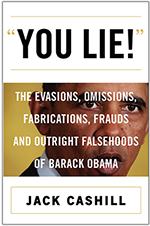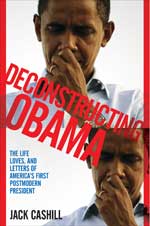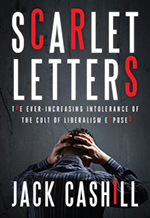The Real Ali the Mythologizers Ignore
Order Jack Cashill's newest book,
Scarlet Letters
___
Get your copy of Jack Cashill's book, "You Lie!"

___
Get your copy of Deconstructing Obama

___
Jack Cashill's book:
Hoodwinked: How Intellectual Hucksters have Hijacked American Culture
© Jack Cashill
WND.com - June 8, 2016
"Do you believe that lynching is the answer to interracial sex?” the Playboy interviewer asked Muhammad Ali. “A black man should be killed if he’s messing with a white woman,” answered Ali.
“And what if a Muslim woman wants to go out with non-Muslim blacks – or white men, for that matter?” asked the interviewer. Said Ali, “Then she dies. Kill her, too.”
This interview took place in 1975, when Ali was 33 years old, and youth was no excuse. The media chose not to hear. They had long since lionized Ali and were hellbent on sanctifying him.
Despite his seeming racism, Muhammad Ali had a fundamentally decent core. Beyond that, he was clever, charismatic, charming, entertaining, a gifted boxer and, in the ring at least, as courageous as any sane man could be.
From the years 1964 to at least 1975, however, he was a mess, and the media steadfastly refused to notice. In the way of example, star sportswriter Roger Kahn praised Ali for “his crystal sense of the irrationality and the cruelty of the society” in the very same year Ali sanctioned the lynching of interracial couples.
The media could never acknowledge what wife Sonji did, namely that Ali was not “his own master.” For those paying attention, the Playboy interview confirmed as much.
Ali belonged heart and soul to the Nation of Islam, an outfit Malcolm X had sadly concluded was a nation of “zombies” – “hypnotized, pointed in a certain direction and told to march.”
Giving the marching orders was NOI honcho Elijah Muhammad. During World War II, Muhammad dodged the draft and actively collaborated with the Axis powers.
When faced with the draft in 1967, Ali yielded to the pressure the anti-white, anti-American Muhammad brought to bear. There was little courage involved, less principle, and no sign at all of independent thought.
Right before the Zora Folley fight, his last before his exile from boxing, Ali called boxing great Sugar Ray Robinson and asked if he could come see him at his New York hotel. Robinson obliged. Ali wanted to talk about the Army.
“You’ve got to go,” said Robinson.
“No,” Ali answered, “Elijah Muhammad told me that I can’t go.”
Robinson explained the consequences of his refusal, and Ali answered, “But I’m afraid, Ray. I’m real afraid.”
Get Jack Cashill’s book “Sucker Punch: The Hard Left Hook That Dazed Ali and Killed King’s Dream”
When Robinson asked if he was afraid of the Muslims, Ali refused to answer. “His eyes were glistening with tears,” Robinson reported, “tears of torment, tears of indecision.”
Ali had good reason to be afraid. Muhammad was not a man to be trifled with. Soon after Ali joined the NOI, he had Ali’s former mentor, Malcolm X, assassinated. Ali had been too scared to intervene.
Happy to make Ali a pariah, Muhammad unwittingly made Ali the patron saint of the ascendant left. Ali’s authoritative biographer, Thomas Hauser, admitted as much.
The anti-war movement, said Hauser, saved the young Ali from the “ugly” mood of the Nation of Islam just as Ali was adopting “the Nation’s persona and its ideology.”
Hauser argued that “when the spotlight turned from Ali’s acceptance of an ideology that sanctioned hate to his refusal to accept induction into the U.S. Army, Ali began to bond with the white liberal community, which at the time was quite strong.”
Although Ali’s manic racial ideology unnerved old-school liberals, the young anti-war crowd proved much more morally flexible, and as Hauser admitted, this faction was “quite strong.”
That faction was strong enough and blind enough to ignore the “ugly” side of Ali’s life. Had Ali not become a reluctant anti-war symbol, he never would have become a symbol of racial healing.
After Muhammad died and the NOI collapsed, Ali turned his life around. If proof were needed, he attended the Republican National Convention as a Reagan supporter in 1984, a fact that drives his mythologizers nuts.
Ali’s glory years, however, were a moral disaster. A summing up of this period of his life sheds some useful light both on the young Ali and the media that made him:
- Ali knowingly betrayed Malcolm X, a betrayal that led at least indirectly to Malcolm’s assassination.
- Ali publicly turned his back on his press secretary, Leon 4X Ameer, which led even more directly to Ameer’s death.
- When Nation of Islam activists executed five friends and family of the Hanafi sect – four of them children – in the D.C. home of Kareem Abdul-Jabbar, Ali did not quit the Nation or even publicly protest.
- For at least four years running, Ali publicly degraded Joe Frazier, often along the crudest racial lines. “There’s a great honor about Joe,” said baseball great Reggie Jackson. “That was evident in the way he fought. And Muhammad ridiculed Joe; he humiliated him in front of the world.”
- Ali was an unapologetic sexist. “In the Islamic world,” he told Playboy in 1975, “the man’s the boss, and the woman stays in the background. She don’t want to call the shots.” Feminists still wrestle over this one.
- Ali left four of his children without a father in the home after rejecting their Muslim mother for a more glamorous, lighter skinned 18-year-old.
- Ali routinely denigrated black heroes who did not share his point of view – Joe Louis, Jackie Robinson and Thurgood Marshall among them.
- Ali shamelessly courted some of the most brutal dictators on the planet: Gadhafi, Amin, Duvalier, Nkrumah, Mobutu, Marcos.
Why have so many people right of center yielded to the Ali myth? Boxer Larry Holmes knew the answer. “He wasn’t a saint,” said Holmes. “But if you tell people something like that they kick your a–. You can’t talk bad about Muhammad Ali.”

Jack Cashill’s new book, TWA 800: The Crash, the Cover up, the Conspiracy can now be pre-ordered on Amazon.


